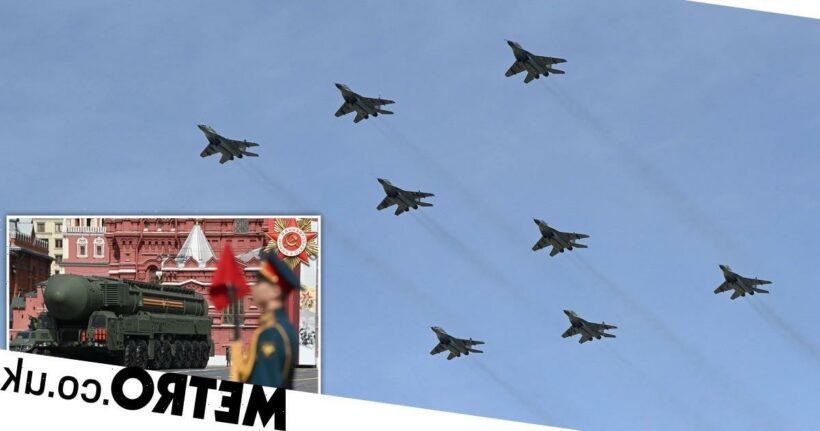Preparations for Russia’s ‘Victory Day’ parade have seen fighter jets form the infamous ‘Z’ symbol over Moscow.
The country’s most important holiday – traditionally marking the defeat of Nazi Germany in 1945 – is also set to see President Vladimir Putin parade his nuclear weapons tomorrow.
The capital’s Red Square will be the scene of a huge parade of soldiers and military equipment – but there is unease about what else the event may bring this year, including fears around conscription, amid the war in Ukraine.
Rehearsals this weekend have seen various weapons on display, including the thermonuclear RS-24 Yars intercontinental ballistic missile, in what some consider to be another chilling threat from the Kremlin.
The letter ‘Z’ has become a symbol of the conflict, decorating buildings, posters and billboards across Russia, and many forms of it use the black-and-orange St George’s ribbon, associated with Victory Day.
Rallies supporting the troops have taken place in recent days at Second World War memorials, with participants singing wartime songs from the 1940s.
Video showed flyovers of various aircraft, some in Z formation.
One official has suggested that Victory Day marchers display photos of soldiers now fighting in Ukraine.
To view this video please enable JavaScript, and consider upgrading to a webbrowser thatsupports HTML5video
Normally on the holiday, Russians carry portraits of their relatives who took part in the Second World War to honour those in the so-called Immortal Regiment from a conflict in which the Soviet Union lost a staggering 27 million people.
In some ways, preparations for the celebration appear relatively similar to previous years at first glance.
Red Soviet flags and orange-and-black striped military ribbons are on display in Russian cities and towns, with local concerts also being staged.
Veterans are laying flowers at monuments to the Second World War, known as the Great Patriotic War in Russia.
But the mood is very different this year, with Russian troops dying in huge numbers following Putin’s invasion of a neighbouring country.
‘I can’t remember a time when the May 9 holiday was anticipated with such anxiety,’ historian Ivan Kurilla wrote.
Now in the 11th week of the invasion, some Russians fear that Putin will use the event to declare that what the Kremlin has previously called a ‘special military operation’ in Ukraine will now be a full-fledged war.
That could bring with it a broad mobilisation of troops to bolster Russia’s forces in Ukraine.
Ukraine’s intelligence chief Kyrylo Budanov said Moscow was preparing a to do so.
British Defence Secretary Ben Wallace told LBC Radio that Mr Putin was ‘laying the ground for being able to say, “Look, this is now a war against Nazis, and what I need is more people”’.
The Kremlin – which has claimed it is attempting the ‘denazification’ of Ukraine – denied having such plans, calling the reports ‘untrue’ and ‘nonsense’.
Asked on Friday whether mobilisation rumours could dampen the Victory Day mood, Putin spokesman Dmitry Peskov said ‘nothing will cast a shadow’ over ‘the sacred day, the most important day’ for Russians.
Yet human rights groups reported a spike in calls from people asking about laws concerning mobilisation and their rights in case of being ordered to join the military.
‘Questions about who can be called up and how have started to flow on a mass scale through our hotline about the rights of conscripts and the military,’ Pavel Chikov, the founder of the Agora legal aid group, said.
Popular support in Russia for the war in Ukraine is difficult to gauge in a country that has seen a steady crackdown on journalists in recent years, with independent media outlets shut down and state-controlled television providing a pervasive influence.
A recent poll by the respected independent Levada Centre found that 82% of Russians remain concerned by the military campaign in Ukraine.
The vast majority of them – 47% – are worried about the deaths of civilians and Russian soldiers in the war, along with the devastation and suffering.
Only 6% of those concerned by the war said they were bothered by the alleged presence of ‘Nazis’ and ‘fascists’ in Ukraine.
Political analyst Andrei Kolesnikov claimed recently: ‘A significant part of the population is horrified, and even those who support the war are in a permanent psychological militant state of a perpetual nightmare.’
Get in touch with our news team by emailing us at [email protected].
For more stories like this, check our news page.
Source: Read Full Article


